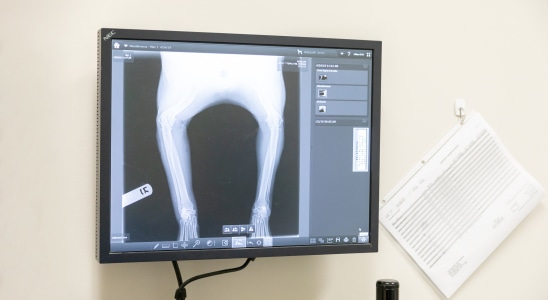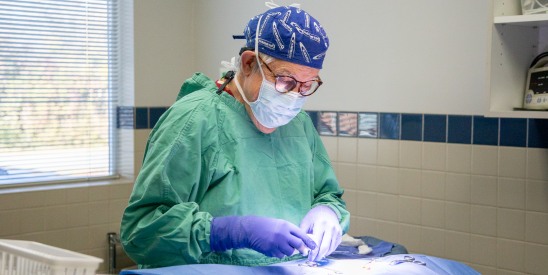Our vets provide orthopedic surgery services for cats and dogs in Thomasville and the greater Davidson County area.
What is orthopedic surgery?
Orthopedic surgery for pets involves surgical procedures that focus on the joints, skeletal system and their associated soft tissues, including muscles, cartilage, tendons, and ligaments.
With our advanced imaging and diagnostic tools, we can provide an accurate and effective orthopedic diagnosis.
If you feel that your cat or dog may need orthopedic treatment, consult your vet.

Common Orthopedic Surgical Procedures
- Anterior Cruciate Ligament (ACL) Repair
- Bone Pinning, Plating, and Kurschner Apparatus Repair
- Shoulder and Elbow Abnormality Corrections
- Luxating Patellar Repair
Your pet could need to remain in the hospital for 3 to 5 days depending on the procedure and how they are recovering.
During this time, we work with patients in the areas of physical therapy as well as pain management.
Common Orthopedic Conditions
The following are among the most common orthopedic conditions we find in cats and dogs:
- Hip Dysplasia
Hip dysplasia is the medical term for a hip socket that doesn't fully cover the ball portion of the upper thighbone. When this happens, the hip joint can become partially or completely dislocated. It is most common in large breed dogs like German Shepherds and Golden Retrievers.
The most effective surgical treatment for hip dysplasia in dogs is total hip replacement. The surgeon replaces the entire joint with metal and plastic implants, returning hip function to a more normal range. - Luxating Patellas
The patella (knee cap) lies in a cartilaginous groove at the end of the femur at the stifle. A luxating patella happens when the knee cap moves out of its natural position. Many dog breeds, both large and small, can suffer from knee cap problems.
For animals that have significant frailness as a result of luxating patellas, surgery is recommended with the goal of holding the patella in its rightful location at all times. - Cruciate Ligament Tears
When dogs suffer tears in their cruciate ligaments, they must be surgically repaired to prevent arthritis - just like in people.
Many different types of surgical procedures are used to repair this injury. The specific type used usually depends on the size of the dog.
CCL surgery for dogs may encompass a variety of techniques that aim to provide stability to the joint. - Disc Disease
Just like humans, dogs can develop disc problems in their necks and backs. Cocker Spaniels, Poodles, Dachshunds and Lhasa Apsos commonly suffer from neck disc problems, while large breed dogs are more likely to have chronic lower back issues.
Dogs with advanced disc disease should have surgery as soon as possible. The sooner that surgery is performed, the better the prognosis.
Orthopedic surgical procedures are not very common and are quite labor-intensive. This also translates into a longer recovery time for the patient. Typically, our orthopedic surgical patients are treated on a case-by-case basis. We recommend a consultation with our doctor prior to any surgical procedures.

Orthopedic Surgery FAQs
- What happens during the surgical consultation?
During the surgical consultation, we will complete a physical exam and review your pet’s medical history. Blood work and any other diagnostic tests that are needed to determine the nature of your pet's condition will also be started at this time.
Diagnostics may include x-rays, an ultrasound, or biopsies. Once the results are back, we will create a surgery plan and discuss it with you.
- Will the surgery take place on the same day as the consultation?
No. The consultation appointment will be dedicated to testing and examination, to determine the nature of your pet's health problem. Once any diagnostic test results have come back from our lab, a surgery appointment can be scheduled.
- How long will the surgery take?
Orthopedic surgeries typically take between 2 to 4 hours, depending on the type of surgery being performed and on your pet’s specific condition.
- Does my pet have to stay overnight before or after the surgery?
Depending on the time of day that the surgery is scheduled, you may need to drop your pet off the night before.
Many of our patients need to stay with us for a week to 10 days after surgery so that we can monitor them as they recover. We also perform physical therapy while they are here in the hospital. Depending on the type of surgery that is performed and how quickly they recover from anesthesia and surgery, your pet may be able to go home sooner than that.
